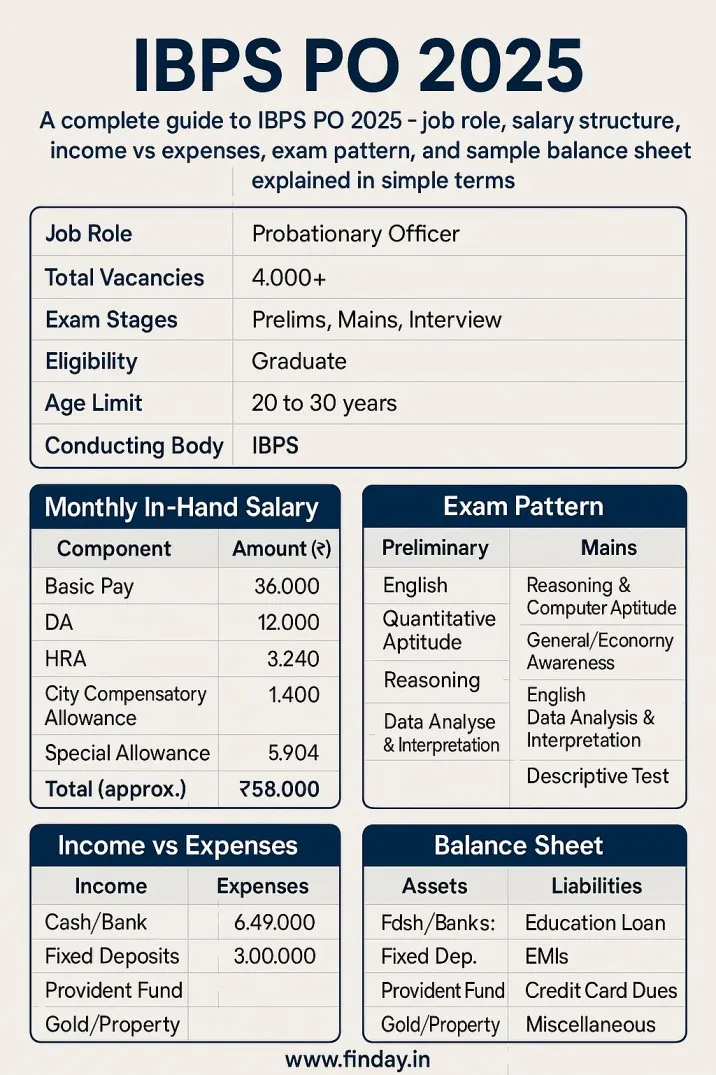📘 What is IBPS PO?
IBPS PO is a job for the post of Probationary Officer in various public sector banks. The recruitment is conducted in three stages:
-
Preliminary Exam
-
Main Exam
-
Interview
After clearing all stages, selected candidates undergo training and probation in the bank.
📅 IBPS PO 2025 Exam Overview
| Feature | Details |
|---|---|
| Exam Name | IBPS PO 2025 |
| Conducting Body | Institute of Banking Personnel Selection |
| Vacancy (Expected) | 4,000+ |
| Mode of Exam | Online (CBT) |
| Job Location | Across India |
| Official Website | www.ibps.in |
💼 Job Role of an IBPS PO
An IBPS PO works as a junior manager in a bank, handling:
-
Customer service
-
Loan processing
-
Report generation
-
Handling daily transactions
-
Supervising clerical staff
💰 IBPS PO Salary Structure (2025)
Let’s break down the typical monthly in-hand salary of a newly joined Probationary Officer:
| Component | Amount (₹) |
|---|---|
| Basic Pay | 36,000 |
| DA (Dearness Allowance) | 12,000 |
| HRA (House Rent Allowance) | 3,240 |
| City Compensatory Allowance | 1,400 |
| Special Allowance | 5,904 |
| Total (approx) | ₹58,000/month |
Net in-hand salary after deductions is around ₹52,000–₹54,000 depending on the city and allowances.
🧾 Financial Report for an IBPS PO (Annual)
Here’s a sample annual income and expense report of an IBPS PO based on current structure:
Annual Revenue
| Income Source | Amount (₹) |
|---|---|
| Basic Salary | 4,32,000 |
| Allowances & Perks | 1,92,000 |
| Bonus (approx) | 25,000 |
| Total Annual Income | ₹6,49,000 |
Annual Expenses (Estimate)
| Expense Category | Amount (₹) |
|---|---|
| Rent/Accommodation | 96,000 |
| Food & Living Expenses | 84,000 |
| Travel & Commute | 24,000 |
| Insurance, Loans, EMI | 60,000 |
| Miscellaneous | 36,000 |
| Total Expenses | ₹3,00,000 |
📊 Sample Balance Sheet (IBPS PO - Individual)
| Assets | Liabilities |
|---|---|
| Cash in Hand/Bank (Savings) | Education Loan (if any) |
| Fixed Deposits | EMI Payables (Phone, Bike) |
| Provident Fund Accumulation | Credit Card Dues |
| Gold or Property (if owned) | Miscellaneous Payables |
| Total Assets: ₹4.5–6 Lakh | Total Liabilities: ₹1–2 Lakh |
Note: Values are illustrative and may vary depending on personal choices.
🧑🎓 Who Can Apply?
Eligibility Criteria:
-
Age: 20 to 30 years (Relaxation for reserved categories)
-
Education: Graduation in any discipline from a recognized university
-
Nationality: Indian citizens
📝 Exam Pattern (Quick Overview)
Preliminary Exam:
-
English: 30 Questions (20 min)
-
Quantitative Aptitude: 35 Questions (20 min)
-
Reasoning: 35 Questions (20 min)
Mains Exam:
-
Reasoning & Computer Aptitude
-
General/Economy Awareness
-
English Language
-
Data Analysis & Interpretation
-
Descriptive Test (Essay + Letter)
✅ Advantages of Being a PO
-
Government-backed stable job
-
Growth opportunities up to General Manager level
-
Pension benefits and gratuity
-
Housing loan at low interest
-
Social respect and prestige
📢 Disclaimer
This blog is for informational purposes only. Financial figures are approximate and may vary by bank, location, and government updates. For official details, visit the IBPS website.


